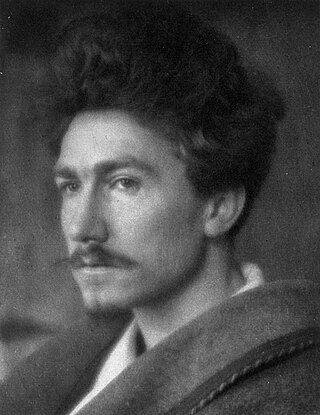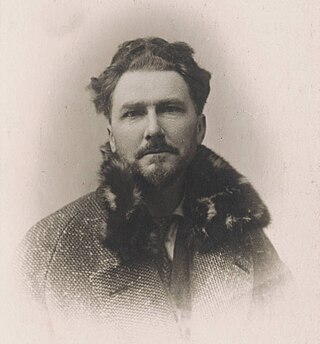Ælfheah, more commonly known today as Alphege, was an Anglo-Saxon Bishop of Winchester, later Archbishop of Canterbury. He became an anchorite before being elected abbot of Bath Abbey. His reputation for piety and sanctity led to his promotion to the episcopate and, eventually, to his becoming archbishop. Ælfheah furthered the cult of Dunstan and also encouraged learning. He was captured by Viking raiders in 1011 during the siege of Canterbury and killed by them the following year after refusing to allow himself to be ransomed. Ælfheah was canonised as a saint in 1078. Thomas Becket, a later Archbishop of Canterbury, prayed to Ælfheah just before his murder in Canterbury Cathedral in 1170.
Old English literature refers to poetry and prose written in Old English in early medieval England, from the 7th century to the decades after the Norman Conquest of 1066, a period often termed Anglo-Saxon England. The 7th-century work Cædmon's Hymn is often considered as the oldest surviving poem in English, as it appears in an 8th-century copy of Bede's text, the Ecclesiastical History of the English People. Poetry written in the mid 12th century represents some of the latest post-Norman examples of Old English. Adherence to the grammatical rules of Old English is largely inconsistent in 12th-century work, and by the 13th century the grammar and syntax of Old English had almost completely deteriorated, giving way to the much larger Middle English corpus of literature.

Thomas Stearns Eliot was a poet, essayist, publisher, playwright, literary critic and editor. He is considered to be one of the 20th century's greatest poets, as well as a central figure in English-language Modernist poetry. His use of language, writing style, and verse structure reinvigorated English poetry. He is also noted for his critical essays, which often reevaluated long-held cultural beliefs.

Ezra Weston Loomis Pound was an expatriate American poet and critic, a major figure in the early modernist poetry movement, and a collaborator in Fascist Italy and the Salò Republic during World War II. His works include Ripostes (1912), Hugh Selwyn Mauberley (1920), and his 800-page epic poem, The Cantos.

Faber and Faber Limited, commonly known as Faber & Faber or simply Faber, is an independent publishing house in London. Published authors and poets include T. S. Eliot, W. H. Auden, Margaret Storey, William Golding, Samuel Beckett, Philip Larkin, Ted Hughes, Seamus Heaney, Paul Muldoon, Milan Kundera and Kazuo Ishiguro.

The Faber Book of Twentieth Century Verse: An Anthology of Verse in Britain 1900-1950 was a poetry anthology edited by John Heath-Stubbs and David Wright, and first published in 1953 by Faber and Faber. A selection in self-conscious contrast to the Faber Book of Modern Verse, it did not attempt to cover American poetry. It has been through numerous further editions. It was last issued as a hardback in St. Clair Shores, Michigan by Somerset Publishers Inc. in 1988 with ISBN 0-403-07212-3.

The canto is a principal form of division in medieval and modern long poetry.
The Seafarer is an Old English poem giving a first-person account of a man alone on the sea. The poem consists of 124 lines, followed by the single word "Amen". It is recorded only at folios 81 verso – 83 recto of the tenth-century Exeter Book, one of the four surviving manuscripts of Old English poetry. It has most often, though not always, been categorised as an elegy, a poetic genre commonly assigned to a particular group of Old English poems that reflect on spiritual and earthly melancholy.
Christine Brooke-Rose was a British writer and literary critic, known principally for her experimental novels.
Sigeric was the Archbishop of Canterbury from 990 to 994. Educated at Glastonbury Abbey, he became a monk there before becoming an abbot and then Bishop of Ramsbury before his elevation to the archbishopric. An account of his pilgrimage to Rome in 990 survives and is an important source for historians studying Rome during his lifetime.

Eduard Sievers was a German philologist of the classical and Germanic languages. Sievers was one of the Junggrammatiker of the so-called "Leipzig School". He was one of the most influential historical linguists of the late nineteenth century. He is known for his recovery of the poetic traditions of Germanic languages such as Anglo-Saxon and Old Saxon, as well as for his discovery of Sievers' law.

Wulfhere was Archbishop of York between 854 and 900.
Eduard Sievers developed a theory of the meter of Anglo-Saxon alliterative verse, which he published in his 1893 Altgermanische Metrik. Widely used by scholars, it was in particular extended by Alan Joseph Bliss. Sievers' system is a primarily method of categorization rather than a full theory of meter. It does not, in other words, purport to describe the system the scops actually used to compose their verse, nor does it explain why certain patterns are favoured or avoided.
Michael Joseph Alexander was a British translator, poet, academic and broadcaster. He held the Berry Chair of English Literature at the University of St Andrews until his retirement in 2003. He is best known for his translations of Beowulf and other Anglo-Saxon poems into modern English verse.
Nationality words link to articles with information on the nation's poetry or literature.
ABC of Reading is a book by the 20th-century Imagist poet Ezra Pound published in 1934. In it, Pound sets out an approach by which one may come to appreciate and understand literature . Despite its title the text can be considered as a guide to writing poetry. The work begins with the "Parable of the sunfish", features a collection of English poetry that Pound called Exhibits and several notable quotations.

Ripostes of Ezra Pound is a collection of 25 poems by the American poet Ezra Pound, submitted to Swift and Co. in London in February 1912, and published by them in October that year. It was published in the United States in July 1913 by Small, Maynard and Co of Boston.
The European was a limited-circulation political and cultural magazine published between 1953 and 1959. It was edited by Diana Mosley of the Mitford family. As Diana Mitford, Mosley had been one of the bright young things and had cultivated friendships with several of the contributors to the magazine. These included Ezra Pound, Henry Williamson, and Roy Campbell. The magazine was published by Euphorion Books, a publishing company formed by Mosley and her husband, Sir Oswald Mosley, founder of the pre-war British Union of Fascists.

Guide to Kulchur is a non-fiction book by the American poet Ezra Pound. Published in London in July 1938 by Faber & Faber, the book examines 2,500 years of cultural history, beginning with the Analects of Confucius. The first chapter was published in Milan in June 1937 as a pamphlet, Confucius/Digest of the Analects, by Giovanni Scheiwiller.

The Vienna Café was a coffee house and restaurant at 24–28 New Oxford Street, London. Located opposite Mudie's Lending Library and near the British Museum Reading Room in Bloomsbury, it became known in the early 20th century as a meeting place for writers, artists, and intellectuals. Regular visitors included Ezra Pound, H. G. Wells, and W. B. Yeats.










